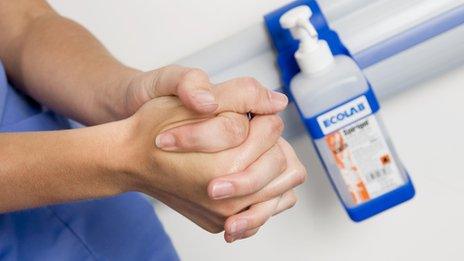MRSA superbug control measures 'lack evidence'
- Published

Infections with MRSA bacteria can be very difficult to treat
The jury is still out on the effectiveness of methods to control the hospital superbug MRSA, according to an international report in the Lancet.
Researchers suggest there is poor evidence to support screening and isolating infected patients - standard practice in hospitals worldwide.
But good hand hygiene and bathing with antibacterial solutions are key to reducing infections, they say.
Experts warn more studies are needed before any change in protocols.
Despite rates of Meticillin resistant staphylococcus aureus (MRSA) falling in many countries, concerns about its spread remain.
The bug is resistant to most antibiotics and while it is can be carried harmlessly on the skin it may lead to serious wound infections - particularly in people who are already unwell.
Combined approaches
Hospitals have used a varied combination of methods to tackle it, including:
careful hand-washing
masks, gloves and gowns for healthcare workers and visitors
screening people for signs of infection before admission
isolating infected individuals in private rooms
Scientists reviewed studies over the last decade.
But most investigated several infection control measures in combination, making it difficult to tease out which ones worked best.
Researchers say the limited evidence focusing solely on isolation or screening suggest they may not reduce spread of the disease and could do more harm than good.
Prof Gerd Fatkenheuer, from the University Hospital Cologne, Germany, who was part of the research team said: "In the haste to do something against the rising tide of MRSA infection, measures were adopted that seemed plausible but were not properly assessed, bundling the effective and harmless with the ineffective and harmful.
"We know for example that isolating patients can result in anxiety and depression and fewer visits by doctors and nurses."
Daily bathing
The scientists emphasise evidence backs good hand-washing and suggests people with the bug should bathe daily using antibacterial solutions.
Prof Peter Collignon at the Canberra Hospital, Australia said: "Certain countries, however, that take all of these combined approaches - such as the Netherlands and Denmark - have the lowest rates of MRSA spread in healthcare facilities.
"So we need to make sure that studies clearly show that we will not do harm by stopping some or all of these isolation methods."
The report authors say as MRSA levels continue to drop this provides a good opportunity to reassess how best to tackle the problem.
And they recommend scarce resources could be redeployed to combat other infections - rather than singling out MRSA.
Recent figures for England suggest 862 cases of MRSA were recorded in the year 2013-14, a substantial reduction from the 4,451 cases reported in 2007-08.
- Published4 May 2012

- Published22 May 2014
